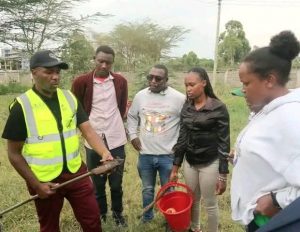Kenya Agricultural and Livestock Research Organisation (KALRO), in partnership with the National Agricultural Value Chain Development Project (NAVCDP) Kajiado and the County Government of Kajiado, has trained agripreneurs and agricultural extension officers in Isinya on digital soil fertility mapping.
While addressing the media after the training, Lucas Tanui, a research officer in KALRO, said that research has shown soil fertility levels have been declining, and this affects the farmers as production goes down, which impacts negatively on food and nutrition security, consecutively affecting the farmers’ income and their livelihood.
He emphasized that both crop and livestock production is declining despite farmers using fertilisers because of the use of wrong fertilisers for given soils, thus affecting pH and acidity levels.
He revealed that the project plans to pilot soil sampling and testing in 1861 sites across the 25 wards within Kajiado, with an average of about 100 sites per ward. The soil samples will be taken to the nearest KALRO laboratories for testing on the nutrient level.
“We used to do blanket recommendation for the type of fertilizer that the farmers will use but with soil testing, we will be giving advice based on evidence,” said Tanui
Mr. Tanui said that the digital soil mapping pilot exercise was initially done in Kiambu and Kajiado Counties with Matapato South and Rombo Wards in Kajiado participating in December 2024.
On his part, NAVCDP County Project Coordinator Philip Koitalel said that the project is targeting five value chains in the county, namely: dairy (both exotic and Sahiwal breeds), chicken, tomato, apiculture, and red meat.
“Soil testing is important in all of the value chains, as it is critical for a livestock farmer to know what soils are best for which fodder. If it is apiculture, one needs to know which kind of plants or flowers do well there as an apiary owner,” said Koitalel.
In the NAVCDP project, the entrepreneurs will implement the project while KALRO will do the technical backstopping.
Francis Metian, Kajiado’s Chief Officer for Agriculture and Livestock, said that soil testing and sampling is a very important activity as it helps farmers to know their soil PH, soil nutrient content, and soil microbiology. This in turn will inform them of the right fertiliser to use if there is a need, as currently most farmers are either overusing fertilisers or using them incorrectly.
KALRO is working to develop digital soil fertility maps countrywide under a project funded by the World Bank.
In the project, more than 77,000 soil samples will be collected from 45 counties excluding Nairobi and Mombasa with the aim of testing the quality of soils that will inform types of interventions targeting to increase food production.
The exercise will also help policymakers to make decisions on the types of fertilisers needed in particular zones and support accordingly and inform the government about the future distributions of the subsidised fertilisers.
It will also guide companies manufacturing fertilisers in how they blend fertilisers to suit the needs of a specific area.
By Diana Meneto









